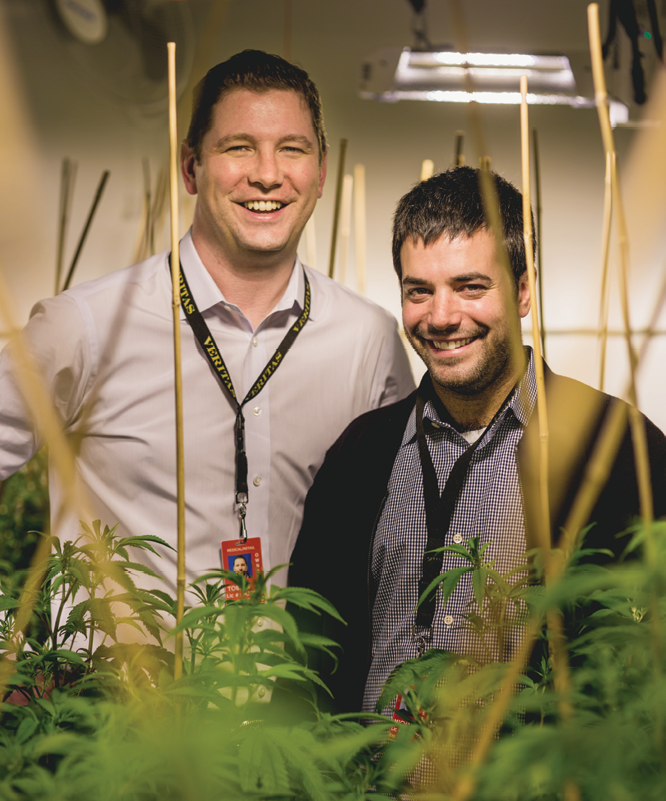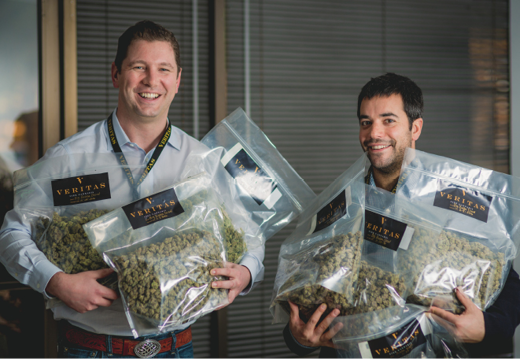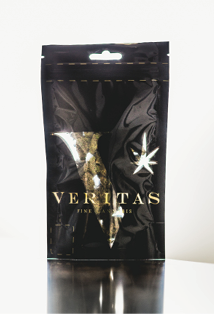10 Questions With Mike Leibowitz & Toby Ripsom
Written by: Kyle Brown

Before they built their brand, both Mike Leibowitz (pictured, right) and Toby Ripsom (left) had already been involved in the Colorado cannabis market for several years. Leibowitz, co-lead master grower for Veritas Fine Cannabis, had signed his first lease for a commercial cultivation facility in 2009.
Ripsom, corporate partner for Veritas, started investing in the cannabis market in memory of his father, who he lost to colon cancer shortly after 2012. Ripsom says he saw “a beautiful side” to how cannabis eased his father’s final year, drawing him in to the legal cannabis market and funding his first investment with life insurance monies.
Leibowitz and Ripsom became friends, and when Colorado legalized adult-use marijuana in 2012, they sensed an opportunity to team up on a new project. They developed the idea for an independent cultivation facility, not tied to a specific dispensary, nor white-labeling their product.
With their license, secured in 2014, they created the Veritas Fine Cannabis brand, now available throughout the state. Cannabis Business Times’ Managing Editor Kyle Brown talked with Leibowitz and Ripsom about building the brand and getting their product in front of consumers.
Kyle Brown: Tell me about your grow.
Mike Leibowitz: We have a 24,000- square-foot facility. Most larger facilities, the way they’ll design their rooms will be much larger. In a 24,000-square-foot facility, they might only have two flowering rooms. We believe we can ascertain the best quality by … having much smaller rooms. We wanted to emulate [the small home grow] in a larger facility. We built 16 rooms. ... [They’re] all very small rooms that we can harvest, thoroughly clean at the same time and be able to replicate the best quality every single harvest by bringing the small-batch theory of growing into a larger facility.
[The rooms are] roughly 600 to 700 square feet each. We put anywhere from 20 to 30 flowering lights in each room. You’re looking at about 100 plants in each room. Nothing too crazy. We believe we can get more from less.

Brown: How does your team work together to handle the entire operation, from cultivation through business?
Toby Ripsom: As you can imagine, it’s a multi-pronged operation. I oversee the finance and the corporate machinations. Mike and Conor [Scanlon] oversee the product and the cultivation side. And we team up together in the middle there.
Leibowitz: I think we all know what we’re good at, and that’s a big thing in a successful partnership. Just trust people and let them do what they do best.
Me and Conor don’t have a lot of interest, necessarily, in some of the financial and administrative ends of the business, and likewise, Toby and his team — it’s not that they don’t have interest, but they really trust us, because the end result is speaking for itself in the success we’ve had. We have our geeks on one end and our geeks on the other. We all meet once a week and go over everything, and we’re all on the same page.
Brown: How did you know Veritas was ready to start building a brand?
Ripsom: We knew, through the evolution of other industries, that we had something special on our hands. With a proprietary growing process, we could become the industry standard of branding that high-quality cannabis that nobody was going near yet. [Business-owners] were branding their storefronts, and they were moving [white-label] product alongside ours that we felt was different.
And we knew that we had customers that were loyal to storefronts because of our product, and we knew we could separate the two and bring a consistency across the state to the many other places that didn’t have our product.
Leibowitz: We really want to put the power of choice in the customer’s hand. That, to us, is the most distinguishing thing about branding. As you’re aware, you could buy Sour Diesel from 100 different dispensers. But it’s not always going to be the same experience from a consumer standpoint.
The way we grow Sour Diesel, and our specific genetics of it, you’re going to get that consistency within our product. It’s going to smell the same, taste the same, look the same, every single time. We realized that if we could put a brand and a name behind it, the customer would know that that’s reliable. They’re going to get what they experienced before and liked, and hopefully … keep wanting to buy more.
We replicate our product to look the same every time, or we’ll toss it into the trim pile. It’ll go to concentrate if we’re not satisfied with it.
I told you we were geeks before. [We have] a lot of passion and a lot of love for the plant. We’ve spent so many hours understanding it, watching every hour of a 65-day plant cycle to perfect the changes ... from its vegetative state, to its flowering state, to its trimming and curing state.
We strive for our own selves to always grow the best, to ... get better yields and to get better quality by making micro changes. ... And for us, because we’re so passionate about it, because we’re constantly challenging ourselves, we consistently are able to produce a top-of-the-line product.
Brown: Why was branding important for you as a company?
Ripsom: We’re able to link the customer to the product, because that’s the relationship that matters at the end of the day. The end user is paramount to everything else.
Leibowitz: The first people to market with brands were not as concerned, I would say, honestly, with just the quality of the product. … We stood behind the quality of what we were doing and came up with a Latin name that means “truth” to sell our product because … the product speaks for itself.
RIPSOM: It’s that differentiation point that makes you not a commodity, and delivering that consistent [product]. That you’re really something different, something special, and that is what you stick to.
Brown: How does this change the market for you?
Ripsom: We operate in the entire state of Colorado, and we are working on expansion into four other states right now, and open to partnering in future markets. Our world is getting larger.
We see that as the market evolves, taste and tolerance are really hockey-sticking upwards for the customer. … There’s knowledge that’s getting attached to the industry, and greater usage is helping the normalization of the business and increasing it, the same way the craft beer industry changed the alcohol world in the late ’80s and early ’90s.
Leibowitz: In Colorado, we’ve had a market now for seven years. The client is becoming more discerning. They are caring more about quality. In the beginning, people were just so enamored with buying pot it didn’t really matter what it was.
That’s changed. People are recognizing even now that they can get an eighth of Veritas, and that will last longer and fulfill … the highness, the taste, everything they want from it. As that becomes more prevalent and people understand and know what better quality looks like, it’s really starting to shape the entire market.
Brown: Part of your team described Veritas to me as “the Sam Adams of the marijuana market.” What does that mean to you?
Ripsom: We’re very proud to be a small-batch, but mainstream producer with a really keen eye on luxury. It’s a luxury product to the typical executive or upper-middle-class customer, but it’s also a trade-up product to somebody who wants a special experience on a weekend. It’s maybe not their go-to, everyday offering.
Leibowitz: The market itself has a variety of needs. We’re well-positioned to satisfy the discriminating taste of the customer who cares, almost like Whole Foods vs. Walmart or Budweiser vs. Sam Adams. We shop at them both and drink them both, but they each have their own time and place, right?

Brown: What were your first steps to creating your brand?
Ripsom: You need product identity and consistency. We put the right team in place to handle the marketing, branding and packaging, and integrated it with how we felt about the image of the business: What we wanted to portray to the outer world, and what we thought served the plant best to our customers.
We went outside the industry for the message because we do think this is a mainstream, normalized product now. We wanted to be a little different. We wanted to be more cosmopolitan … for lack of a better term.
We leaned on almost every aspect of the vice markets, whether it be night clubs, alcohol, casinos, that sort of product. We [looked at] the evolution of industries that were once illegal that rose up into mainstream America and have been profitable and world-class ever since, and a valid, major part of American society.
Brown: When you were going through names and logos, when did you know you had the right one?
Ripsom: When we got to 300 names?
Leibowitz: Yeah. [laughs] We wanted it to look sharp, to look like what we were going for: high-end, luxury.
Ripsom: It’s a sophisticated, everyday luxury product that we thought of like a Mercedes or and Audi.
Brown: How did you choose which strains you were focusing on?
Leibowitz: That comes with the experience of certain strains, continuing to challenge our grow staff with a “new hotness” … or just what comes around.
We’ve got a lot of smart people on our staff that do some in-house breeding. We’ve mixed some different flavors over the years. But really, … the hard part isn’t trying to find the strains. It’s trying to reduce them to a manageable number.
As a brand, you don’t want to have too many products. … Our genetic library is probably over 50 proprietary strains. These guys tell me to focus on 10. I like all 50. So, it’s really hard for me to make those choices. We want to have a consistent offering of our top sellers, as well as flavor profiles that are new to the market.
Take Girl Scout Cookies, for example. That was very popular a few years ago, and really had a big intro to the market. Since then, we have worked on about three different strains in our portfolio that are a cross of Girl Scout Cookies that add a certain hype. When they get introduced, ... [the strains] just have a beautiful look, smell and a taste everybody craves.
We have certain strains, like our Sueño or our Headband Kush that are kind of our staple strains that we’ve been growing for such a long time. They’re such popular strains, and we’ll never stop, at least in the short term, growing them.
But like I said, this is a business where we are really challenging ourselves. So, like a craft beer might produce a fall lager, we’ll always keep it fresh and probably have anywhere from three to four new strain offerings a year that we … deem admissible to the market.

Brown: How have you gotten dispensaries to work with you on such a large scale?
Ripsom: We have a wonderful sales staff, and a great product that sells itself, most of the time. However, it’s the dispensary’s job to open the door and put us on the shelf, and it’s our job to get the customers in there buying our product and everyone else’s.
We’ve brought a bit of the vice industry management route. We looked at liquor sales strategies that have worked time and again in almost every market. In the beginning, we did make a lot of sales just from word-of-mouth. But it’s kind of hand-to-hand combat … going into other dispensaries, giving them all kinds of sales support. [They’re doing] everything in their power to move our product faster. The effort on our end is to make it as easy for them as possible. As we like to say, the most expensive pound you’re going to buy is the one that doesn’t move. So it doesn’t matter what it costs. As long as it doesn’t sit on that shelf, everyone’s happy.
We do some meet-and-greet events, where we have Mike and Conor and some of our extended team go to dispensaries. We’ve had quite the turnout. It helps build social media presence, too.
Leibowitz: We hang out at a busy time at the dispensary, on a Friday afternoon or something ... when there will be a lot of people coming in. The reaction we get is often incredible. People come in and say, “Wow, you’re Veritas. We love your Sueño. I drive all the way from over here to come buy it, and it’s phenomenal. How do you do that?”
People pick our brain, we get to meet them, and it’s cool. It’s neat to get a little appreciation for our work sometimes, because a lot of us have been in the shadows — or actually, the artificial light — of a grow room for a long time.
Ripsom: We loved the aspect of putting a face to the brand, and kind of a story. It makes it more a social experience. ... It’s a culture and a lifestyle, and we’re very interactive with our people. We go all out socially and love to keep in touch with all the customers and grow the market.
Leibowitz: When you build a brand, you have to connect with your customers. The best way to interact with them is to know what they like.
How are we really going to know what they love, what makes them say, “Grow more of that. That one is good.” We feel it’s just the best way to continue to improve ourselves. As great as we are, obviously, everyone can always get better. And that interaction allows us to do that.

